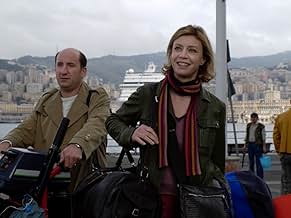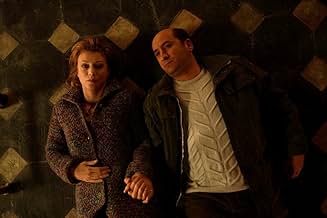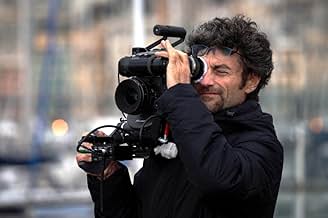VALUTAZIONE IMDb
6,9/10
3170
LA TUA VALUTAZIONE
Una coppia benestante e sofisticata lotta per stare insieme dopo che il marito perde il lavoro.Una coppia benestante e sofisticata lotta per stare insieme dopo che il marito perde il lavoro.Una coppia benestante e sofisticata lotta per stare insieme dopo che il marito perde il lavoro.
- Regia
- Sceneggiatura
- Star
- Premi
- 6 vittorie e 35 candidature totali
Recensioni in evidenza
The movie is crazy, sweet, and its story is sweet. I really liked it. I recommend it to you. It has exciting events. Don't miss it. My rating for it is above ten. Honestly, it deserves it. Other than the legendary actors in it, I worked hard and I am praising it, but honestly, even the introduction is exciting and suspenseful. It makes you follow it subconsciously and get involved in it right away. You will like it. Watch it and give me your rating for it out of ten. Does it deserve it or not? I will see if I am exaggerating or if it really deserves ten.
Days and Clouds (2007)
Tender, true, and rather moving without being the slightest bit sentimental. This is a look at normal life, in a way, in modern Northern Italy (the setting is Genoa). A fairly comfortable middle aged couple is going through a crisis as one loses a job and the money crunch adds to other everyday stresses.
And that's it. Which is a lot when you realize that that's it. There will be no murder or shocking accidents, no illness or surprise turn of events of any kind, really. Which is why it draws you further and further, gently, with more humor than pathos, until you really believe these people, or these kind of people, exist quite like this. It's not a random slice of life, since there is certainly a core problem being scrutinized (the loss of a job in mid-life, etc.). But in many ways the little events are so "little" in the cinematic sense they are just a small pageant for the viewer.
So what makes it sing beyond the compelling, restrained story is the acting, above all the acting. The couple, the husband and wife facing the crisis, makes sense because the woman (Margherita Buy) and the man (Antonio Albanese) are so perfect at being imperfect. They don't push their crisis too hard, nor do that have the ideal love at the beginning. What they show is the normal troubled tenderness and awkward anger of getting into such a situation.
Besides a second thread following somewhat their daughter's life, which has taken a less materialistic turn then the parents, the movie adds a whole other element throughout--early Renaissance art. The mother happens to have just finished (belatedly) her graduate degree in Italian art from the 1400s. And she is helping restore an obscure small ceiling painting somewhere else in town, seeing it gradually reveal itself as the movie progresses. The reason this matters is it adds an element of beauty and idealism that is implied by the whole rest of the movie. That we (all of us) are not simply here to make ends meet and worry about money. And this something bigger (call it art, call it something spiritual inspired by art or inspiring art) is what holds us up at times.
So by the end the two aspects--the mundane and the ethereal--meld, every so softly. Quite beautiful.
Tender, true, and rather moving without being the slightest bit sentimental. This is a look at normal life, in a way, in modern Northern Italy (the setting is Genoa). A fairly comfortable middle aged couple is going through a crisis as one loses a job and the money crunch adds to other everyday stresses.
And that's it. Which is a lot when you realize that that's it. There will be no murder or shocking accidents, no illness or surprise turn of events of any kind, really. Which is why it draws you further and further, gently, with more humor than pathos, until you really believe these people, or these kind of people, exist quite like this. It's not a random slice of life, since there is certainly a core problem being scrutinized (the loss of a job in mid-life, etc.). But in many ways the little events are so "little" in the cinematic sense they are just a small pageant for the viewer.
So what makes it sing beyond the compelling, restrained story is the acting, above all the acting. The couple, the husband and wife facing the crisis, makes sense because the woman (Margherita Buy) and the man (Antonio Albanese) are so perfect at being imperfect. They don't push their crisis too hard, nor do that have the ideal love at the beginning. What they show is the normal troubled tenderness and awkward anger of getting into such a situation.
Besides a second thread following somewhat their daughter's life, which has taken a less materialistic turn then the parents, the movie adds a whole other element throughout--early Renaissance art. The mother happens to have just finished (belatedly) her graduate degree in Italian art from the 1400s. And she is helping restore an obscure small ceiling painting somewhere else in town, seeing it gradually reveal itself as the movie progresses. The reason this matters is it adds an element of beauty and idealism that is implied by the whole rest of the movie. That we (all of us) are not simply here to make ends meet and worry about money. And this something bigger (call it art, call it something spiritual inspired by art or inspiring art) is what holds us up at times.
So by the end the two aspects--the mundane and the ethereal--meld, every so softly. Quite beautiful.
10enamcaty
*Days and Clouds* (2007) is an Italian drama film directed by Silvio Soldini. It follows Elsa and Michele, a wealthy middle-aged couple whose comfortable life shatters when Michele loses his job. Elsa, an art historian, is forced to take small jobs while Michele struggles with pride and despair. Their once-loving relationship strains under financial stress, leading to personal transformation and a reassessment of their priorities. The film explores themes of economic instability, resilience, and love in adversity, portraying a realistic and emotional journey of adaptation and rediscovery.woww!
10fouadice
"Giorni e nuvole" (2007) is a poignant exploration of love, loss, and resilience. The film beautifully captures the essence of life's unpredictability, showcasing the impact of financial crisis on a seemingly perfect family. The performances are exceptional, particularly by the lead actors, whose chemistry is palpable. The cinematography is stunning, enhancing the emotional depth of the narrative. Director Silvio Soldini crafts a delicate balance between drama and hope, making the viewer reflect on their own relationships. This film is a masterpiece that resonates long after the credits roll, deserving a solid 10-star rating for its heartfelt storytelling and artistic brilliance.
Giorni e Nuvole is a poignant and deeply human exploration of the fragility of economic security and the resilience of love. Directed by Silvio Soldini (Pane e Tulipani), the film follows Elsa (Margherita Buy) and Michele (Antonio Albanese), a well-off middle-aged couple in Genoa, whose lives unravel after Michele loses his job but hides it from Elsa for months.
The film is not just about job loss-it's about identity, pride, and the shifting power dynamics in a long-term relationship. Elsa, who has just completed her art history degree and quit her job to follow her passion, is suddenly thrust into financial uncertainty. Michele, meanwhile, struggles with his pride and a sense of emasculation in a society where success is still very much tied to male status.
Silvio Soldini masterfully captures the slow, emotional descent of the couple's life: the loss of comforts, the strain on communication, and the raw vulnerability that emerges. The film avoids melodrama, instead relying on subtle performances and realistic dialogue. Margherita Buy delivers a particularly nuanced performance-Elsa is dignified yet visibly unraveling. Antonio Albanese's portrayal of Michele is restrained but powerful, evoking sympathy even when his character makes frustrating choices.
Cinematographically, the film leans into cold blues and grays, reflecting the mood of uncertainty and loss. The pacing is deliberate, mirroring how life's biggest changes often come not as explosions, but as a slow crumbling.
The film is not just about job loss-it's about identity, pride, and the shifting power dynamics in a long-term relationship. Elsa, who has just completed her art history degree and quit her job to follow her passion, is suddenly thrust into financial uncertainty. Michele, meanwhile, struggles with his pride and a sense of emasculation in a society where success is still very much tied to male status.
Silvio Soldini masterfully captures the slow, emotional descent of the couple's life: the loss of comforts, the strain on communication, and the raw vulnerability that emerges. The film avoids melodrama, instead relying on subtle performances and realistic dialogue. Margherita Buy delivers a particularly nuanced performance-Elsa is dignified yet visibly unraveling. Antonio Albanese's portrayal of Michele is restrained but powerful, evoking sympathy even when his character makes frustrating choices.
Cinematographically, the film leans into cold blues and grays, reflecting the mood of uncertainty and loss. The pacing is deliberate, mirroring how life's biggest changes often come not as explosions, but as a slow crumbling.
Lo sapevi?
- QuizOrietta Notari's debut.
- Colonne sonoreSono Tremendo
Written by Giosy Capuano (as G.Capuano), Mario Capuano (as M.Capuano) and Danilo Ciotti (as A.D.Ciotti)
© Edizioni Chappell, S.r.l. / Fonit Cetra Music Publishing, S.r.l.
Performed by Pivio & Tuscolano Brothers
Courtesy of Warner-Chappell Music (Italiana), S.r.l.
I più visti
Accedi per valutare e creare un elenco di titoli salvati per ottenere consigli personalizzati
Dettagli
Botteghino
- Budget
- 300.000 € (previsto)
- Lordo Stati Uniti e Canada
- 112.102 USD
- Fine settimana di apertura Stati Uniti e Canada
- 16.707 USD
- 13 lug 2008
- Lordo in tutto il mondo
- 6.966.224 USD
- Tempo di esecuzione
- 1h 58min(118 min)
- Colore
- Mix di suoni
- Proporzioni
- 1.85 : 1
Contribuisci a questa pagina
Suggerisci una modifica o aggiungi i contenuti mancanti
















